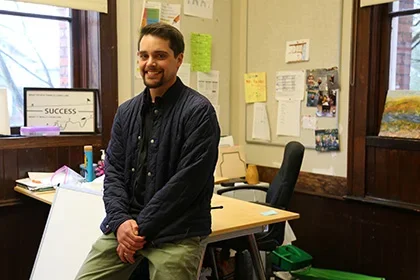School Counselor
School Updates
B.F. Day School Counselor Mr. Taylor
I am John Taylor, the school counselor at B.F. Day for the 24-25 School Year. The school counselor role is one that is multi-faceted and unique. Duties may include, but not limited too; individual student planning, small groups on friendship/anxiety/emotional regulation/family separation collaborating with community resources to support families, advocating for students and families, responding to daily concerns from students/staff and families and lastly, being an advocate for our students and their needs. It truly takes a village to raise and support a child.
“You have brains in your head. You have feet in your shoes. You can steer yourself any direction you choose.” ~Dr. Seuss
Quick Links
Taylor’s Tidbits In the Dayette
National School Counseling & Career Week
On February 3-7 B.F. Day will celebrated National School Counseling Week! Thank you to the PTSA for their ongoing support of school counseling. B.F. Day is proud to have a full- time school counselor and is the first school in Seattle Public Schools to achieve RAMP (Recognized ASCA Model Program) status through the American School Counselor Association (ASCA). In July of 2024, B.F. Day was one of 60 elementary schools nationally to be recognized with RAMP designation at the annual ASCA conference.
B.F. Day is one of five schools in Washington state designated as a “RAMP School.” Join us in celebrating our school counselors, Mr. Taylor and Ms. Mara, on February 3-7.
At B.F. Day, we celebrate National School Counseling Week as Career Week. During Career Week, our fourth and fifth grade students will listen to guest speakers discuss their pathway to their career, obstacles they overcame, responsibilities of their career, and take questions from the students. In all, we will have 20 speakers presenting to our fourth and fifth graders. Throughout the week, students will be engaging with college and career readiness skills.
This year, our kindergarten – third grade students will also participate in Career Week! Four speakers will share about their careers with our youngest students. Thank you to all of our volunteers that are supporting Career Week this year! Learn about the speakers on the B.F. Day emailed Dayette on Jan. 24 or the PDF on the B.F Day Family FB.
RAMP Award
The Recognized ASCA Model Program (RAMP) recognizes schools committed to delivering school counseling programs aligned with the ASCA National Model framework.
The RAMP designation demonstrates to administrators, school boards, families and the community at large that the schools are committed to supporting the mission of the school and district. Learn more in the tab below.
B.F. Day Elementary
School Counselor: John Taylor
Principal: Dr. Natalie Zisko








